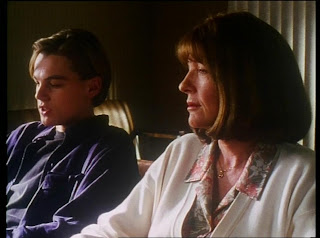Monday, 29 April 2013
Movie Review: Marvin's Room (1996)
A drama about the threads that connect siblings across the passing years, Marvin's Room is a weepie with a stellar cast. The performances keep the film afloat, while the story struggles to find a consistent and genuine tone.
In Florida, Bessie (Diane Keaton) has dedicated her life to care for her ailing father Marvin (Hume Cronyn), who is bedridden and hallucinatory. It's been 20 years since Bessie talked with her sister Lee (Meryl Streep), a single mom living in Ohio and struggling to raise two boys: the brooding, angry Hank (Leonardo DiCaprio) and the bookish Charlie (Hal Scardino). Hank's anti-social behaviour descends into arson, and he burns Lee's house to the ground and gets incarcerated in a mental institution for juveniles.
When Dr. Wally (Robert De Niro) diagnoses Bessie with leukaemia, she reconnects with Lee and invites her and the boys to come to Florida to get tested as potential bone marrow donors. As the two sisters get reacquainted their past troubles bubble to the surface, and any potential for new and better relationships between Bessie and her nephews is coloured by Bessie's desperate search for help.
Based on the play by Scott McPherson, Marvin's Room tries hard to find all the right notes. While it's difficult to go wrong with this cast, the emotions rarely strike the desired purity. The behaviours and motivations of Lee, Bessie and Hank are either too crude or change too suddenly, leaving in their wake seemingly entrenched and deeply resentful callow attitudes which nevertheless are subject to head-snapping sharp turns, for no apparent reason except the need to move the script in the general direction of a family reconciliation.
So we get Bessie reaching out to her sister after 20 years of estrangement, Lee responding to Bessie's appeal without a second thought despite being full of anger at her sister, Lee pushing all the obviously wrong buttons in her pitiful attempts at mothering Hank, Bessie immediately finding all the right words to say to her nephew without really trying, and all the family members stumbling into serious attitudinal shifts that sweep away the past with fantastic ease.
Devoid of serious narrative credibility, Marvin's Room is left with an outstanding cast, and any film boasting Keaton, Streep, De Niro and an emerging DiCaprio will pull through. Keaton gets the juiciest part as the woman who has dedicated herself to a dying father now needing help to delay her own death. The shifted reality of Bessie's every move towards Lee and Hank being measured through the lens of Bessie's desperate need for help is a new paradigm for a woman who has always been the one providing the help, rather than asking for it. With measured despair, Keaton walks the fine line between opening her heart to her sister and nephews while withstanding their suspicious scrutiny.
Streep's character is more linear and in many ways easier, Lee the perfect example of clueless mother and selfish sister, and her rather abrupt transformation to a caring human being is one of the incredulous stretches that the script strains to grasp. DiCaprio's role is all about teenage intensity and general rage stemming from an absentee father and disconnected mother, and while Hank undergoes a modest humanization thanks to Bessie's gentle words, it is again an all too amazing change for a deeply angry young man to undergo in a matter of hours. De Niro's inelegant Dr. Wally is a secondary character, mostly deployed for mild comic effect.
With all the acting talent at his disposal director Jerry Zaks, whose experience is mostly on the stage, wisely avoids stylistic distractions and allows the stars to shine. The moderate charms of Marvin's Room reside not as much in the story but in watching master actors performing their craft.
All Ace Black Blog Movie Reviews are here.
Subscribe to:
Post Comments (Atom)




No comments:
Post a Comment
We welcome reader comments about this post.